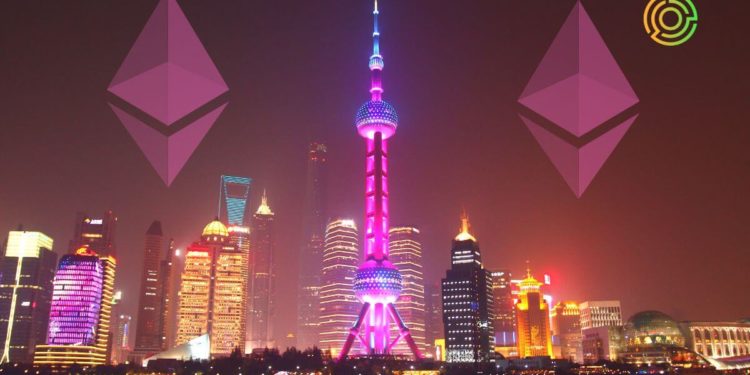The Ethereum (ETH) blockchain recently completed the highly anticipated Shanghai upgrade, resulting in a surge in the altcoin’s price. In this article, we will explore the latest developments in Ethereum’s network upgrade, the impact on the market, and the changes it brings to the proof-of-participation network.
The Shanghai Upgrade
The Shanghai upgrade marks a significant transformation for the Ethereum network since The Merge upgrade was implemented last year. The Merge revolutionized the blockchain’s operating procedures by shifting from miners to validators.
Miners used to employ computers to solve complex mathematical problems to safeguard the blockchain, but this had a significant environmental impact due to energy consumption and carbon emissions.
With The Merge, Ethereum transitioned to a proof-of-participation consensus algorithm, where validators stake or immobilize their coins to authenticate new transactions.
This shift resulted in a more than 99% reduction in Ethereum’s energy consumption, as reported by the Ethereum Foundation. However, one limitation was that coin holders who had staked their coins were unable to unlock them.
The Shanghai upgrade addresses this limitation by allowing validators to withdraw their tokens through two main withdrawal methods: partial and full withdrawal. Partial withdrawal allows validators to keep the rewards they earned by staking while still staking their ETH.
On the other hand, full withdrawal allows participants to withdraw their initial capital and completely stop participating in the ecosystem.
Market Reaction to Shanghai
The successful execution of the Shanghai upgrade has had a positive impact on the market, with Ethereum’s price surpassing the $2,000 mark for the first time since May 2022. According to CoinGecko, Ethereum is up nearly 6% in the past 24 hours, with ETH trading at around $2,100 on major exchanges.
This significant price surge can be attributed to the positive market reaction to the successful upgrade of Shanghai, which has instilled confidence among investors and users alike.
The upgraded features and improvements in performance, security, and scalability have been well-received by the community, leading to increased demand for Ethereum.
Additionally, the successful execution of the upgrade has further solidified Ethereum’s position as a leading blockchain platform for decentralized applications (dApps) and smart contracts, attracting more attention from developers and enterprises.
The market is anticipating further positive developments from Shanghai and its potential impact on the overall cryptocurrency market.
The Impact of Shanghai Update on Ethereum (ETH)
The Shanghai update has brought significant changes to the Ethereum (ETH) blockchain, with implications for its users and investors. This highly anticipated upgrade has resulted in the altcoin’s price surpassing the $2,000 mark for the first time since May 2022, indicating a positive response from the cryptocurrency community.
IMPORTANT NOTICE: Along with the Ethereum Merge the Ethereum Energy Consumption Index will be updated to reflect a new estimate for PoS Ethereum.
It may take up to two days after PoS ETH is live for the Index to fully reflect the new value.
Expected energy savings: 99.98%
— Digiconomist (@DigiEconomist) September 13, 2022
The Evolution of Ethereum
The recent update from Shanghai marks a significant milestone in the evolution of Ethereum. The blockchain has come a long way since the implementation of The Merge upgrade last year, which revolutionized its operating procedures.
Prior to The Merge, Ethereum relied on miners who used computational power to solve complex mathematical problems to secure the blockchain and manage transactions.
However, mining operations had a significant environmental impact due to their high energy consumption and carbon emissions. To address these concerns, Ethereum transitioned to a proof-of-participation consensus algorithm, replacing miners with “validators” who stake or immobilize their coins to authenticate new transactions.
This change led to a more than 99% reduction in Ethereum’s energy consumption, as reported by the Ethereum Foundation.
Unlocking Staked ETH with Shanghai Update
While The Merge brought about positive changes in terms of energy consumption, one drawback was that coin holders who had staked their coins were unable to unlock them.
This limitation has now been addressed with the Shanghai update, allowing validators to withdraw their tokens through two main withdrawal methods: partial and full.
A partial withdrawal occurs when validators receive the rewards they earned by staking but choose to keep the ETH in the validation node. On the other hand, a full withdrawal happens when participants withdraw their initial capital and completely exit the ecosystem, allowing validators to stop participating in their accumulated ETH and rewards.
This new feature has been eagerly awaited by Ethereum validators, as it provides them with the flexibility to manage their holdings and rewards. It also addresses the concerns of those who were hesitant to stake their coins due to the inability to unlock them.
Impacts on the Market and Trading Activity
The successful execution of the Shanghai update has had a significant impact on the market and trading activity surrounding Ethereum. Settlement data from Coinglass suggests that bearish traders may have misjudged the situation, with Ethereum leading the pack with over $44 million in settled trades in the past 24 hours.
Interestingly, approximately 77% of these positions were short, indicating a possible shift in sentiment towards a more bullish outlook.
The ability to unlock staked ETH has also allowed Ethereum investors to cash out their holdings, leading to speculation about the potential bearish momentum on the network. Data extracted from Nansen shows that many validators have exited, taking their Ethereum staked and rewards with them as they leave. In the past 24 hours, there has been a net outflow of more than 84,500 ETH, indicating a significant movement of funds.
Future Implications
The Shanghai update represents a major milestone in the evolution of Ethereum, providing validators with the ability to unlock their staked ETH and manage their holdings more effectively.
This update has positive implications for the market and trading activity surrounding Ethereum, with potential shifts in sentiment and trading patterns.
As the Ethereum blockchain continues to evolve and undergo updates, it is important for users and investors to stay informed and adapt their strategies accordingly. The Shanghai update is a significant development that has addressed a major concern for Ethereum validators and is expected to have a lasting impact on the cryptocurrency ecosystem.
Conclusion
The Shanghai update has been a game-changer for the Ethereum blockchain, ushering in significant changes that have greatly benefited validators.
With the ability to unlock their staked ETH, validators now have increased flexibility in managing their holdings, allowing them to adapt to changing market conditions and optimize their strategies.
This update has not only had a positive impact on validators but has also influenced the overall market and trading activity surrounding Ethereum.
It has potentially led to shifts in sentiment among investors and traders, as well as changes in trading patterns as they navigate the new landscape created by the Shanghai update. Overall, the update has had far-reaching implications for Ethereum and its ecosystem, shaping the future of the blockchain and its participants.
Follow us on our social networks and keep up with everything in the Metaverse!
Twitter Linkedin Facebook Telegram Instagram Google News












































